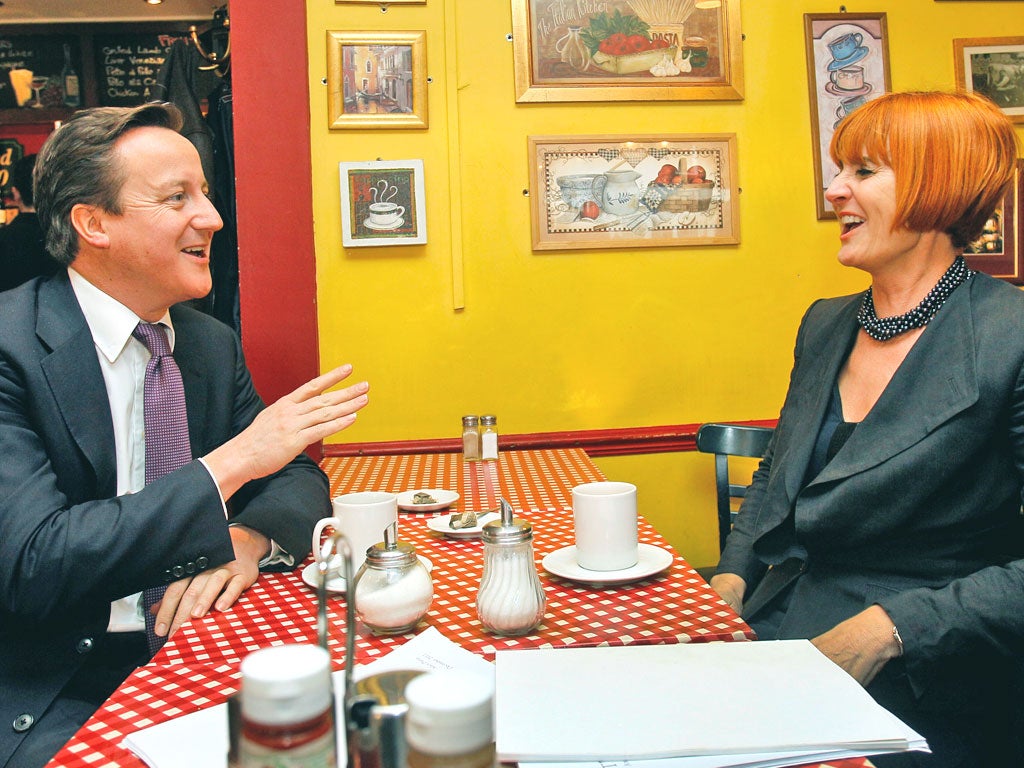Mary, scourge of shops?
She's telling the Government how to save the high street – while also working for one of Britain's biggest malls

The TV presenter Mary Portas yesterday laid out her vision to rescue the UK's ailing high streets but refused to answer questions about her PR company's links to the big property developer Westfield and other retailers.
Acknowledging the high street had reached "crisis point", the self-styled Queen of Shops unveiled 28 key proposals to revitalise town centres – where more than 14 per cent of shops are empty – including establishing a "National Market Day" to encourage budding shopkeepers. She also recommended "Town Teams" comprising of groups, including landlords, retailer and councillors to develop a more "vibrant" high streets.
However, arguably the most eye-catching was her recommendation for the Secretary of State for Communities and Local Government to be given "exceptional sign off" powers for all future shopping centres and out-of-town planning applications. Ms Portas said the proposal would "make it harder" for the big supermarkets and property developers to build huge sites outside of towns. She also recommended out-of-town schemes include some "designed space for smaller retail units for local entrepreneurs".
Her comments have raised eye brows as Ms Portas' PR firm looks after the marketing for Westfield, the Australian property developer that runs monolithic shopping centres in cities including Derby and Merry Hill, near Birmingham. It also operates a mall in west London's Shepherds Bush and Westfield Stratford City, which is Europe's largest urban shopping centre at 1.9m square feet, with 300 shops.
Traders on Kensington High Street yesterday told The Independent how competition from the west London mall had damaged some shops on the road.
Questioned on her links to Westfield, Ms Portas, who shot to fame with her Mary Queen of Shops series on BBC2 , said she "was not getting into that" and was dismissive when she was asked if her call for a "town centre first" policy could affect business at Westfield.
In theory, the Australian developer could benefit from a clamp down on further out-of-town developments, as its existing sites are typically located in densely populated town centres. Indeed, Malcolm Dalgleish, the chairman of retail at CBRE in Europe, the property services company,said Ms Portas' "exceptional sign off" proposals could inadvertently play into the hands of the big property companies. "The more you interfere with open market forces, invariably it has a positive impact for property owners," he added.
Ms Portas' PR firm Yellow Door also handles communications for the fashion chain Matalan and the shoe retailer Clarks. Stephen Robertson, the director general of the British Retail Consortium, said: "We welcome the central thrust of Mary Portas' recommendations for the high street – that they respond to changing customer demands – but we're concerned a couple of proposals have the potential to make development more difficult."
Decoded: The Portas plan
1. New 'National Market Day' where budding shopkeepers can start a business.
Pro Those who can't afford property costs will be able to give retail a try without the overheads.
Con Shoppers prefer the low cost but reliability of supermarkets and out-of-town shops. It will be difficult for a 'Market Day' to change this.
2. Local authorities to give business rates help to start-up retailers.
Pro Business rates is the great prohibition to start-up retailers, as rates are usually more than 40 per cent of the rental charge.
Con Cash strapped councils will find it hard to reduce their rates bills, while established local independent retailers will claim an unfair advantage for new kids on the block.
3. Create disincentives for landlords to leave shops empty.
Pro Empty shops are the biggest blight to the high street.
Con Landlords are already struggling to find tenants for vacant shops and are already hit by the large cost of business rates for these empty shops
4. Introduce Secretary of State "exceptional sign off" for all new out-of-town developments.
Pro Could curtail, or lead to more suitable and controlled, developments on the edge of towns which complement high streets.
Con The horse has already bolted. The big four grocers plan to develop 19 million square feet of new space between 2010 and 2014.
5. Put in place a "Town Team" – an operational management team to deliver a vision for a high street.
Pro Will allow stakeholders to collaborate and take responsibility for their high street.
Con Stakeholders are likely to have diverging views, and non-retailer and non-landlord participants may not have real clout.
Kensington high street view: 'Westfield has taken our business away'
"The door-to- door experience of high street shopping is something you can't get at a shopping centre."
Barbara Cugnasca, area manager, Trilogy
"Rates and rentals need to be much lower so smaller and more diverse businesses can have a chance."
Dipak Patel, manager, Pestle and Mortar
"Westfield has taken a lot away – fortunately we've been okay because there aren't any bike shops there."
Ian Harding, manager, CycleSurgery
"There's a problem with Mary Portas championing high streets while also advising Westfield."
Laura Ballantine, manager, Yacco Maricard
Subscribe to Independent Premium to bookmark this article
Want to bookmark your favourite articles and stories to read or reference later? Start your Independent Premium subscription today.

Join our commenting forum
Join thought-provoking conversations, follow other Independent readers and see their replies